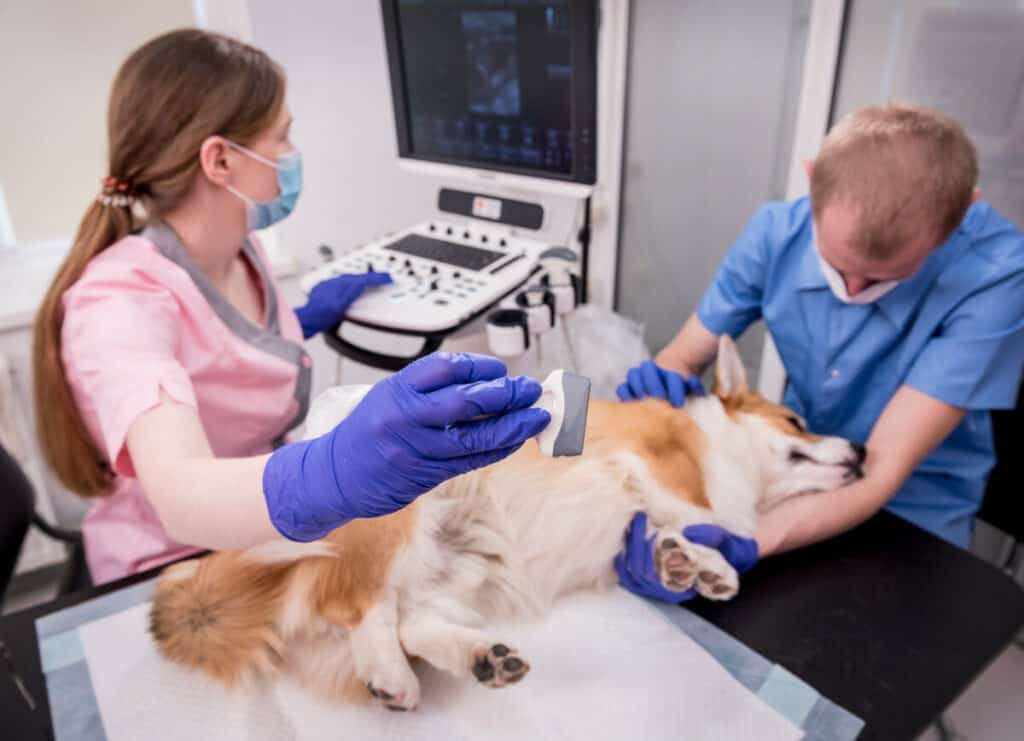
Anyone who has bred a dog will tell you that lactation in a female dog is perfectly natural, and they would be right. What about female dogs that have not had puppies? Is it normal or healthy for dogs who are not pregnant to lactate?
Female dogs can lactate for a number of reasons, including false pregnancy, hypothyroidism, and mammary gland tumors. While not all of these are serious health concerns for the dog, it's a good idea to track any unusual behaviors or symptoms and contact a veterinarian if the lactation persists.
What exactly is a normal or healthy reason for a female dog that is not pregnant to lactate? What are other causes or symptoms of irregular lactation? Let us take a look at some of these answers below.
Normal Lactation Scenarios
Aside from the obvious cause for lactation in a female dog— pregnancy— there are plenty of situations in which perfectly healthy dogs lactate without having a litter or being pregnant.
First, lactation is caused by the rapid decrease in the hormone progesterone and an increase in the hormone prolactin. Dogs who have given birth to litters of puppies in the past may experience spontaneous lactation. Lactation may also occur in dogs who have never been pregnant.
The hormonal changes that bring on lactation are common around a dog's heat cycle. This is because the hormone production during a dog's heat is remarkably similar to the hormone production in a dog that has become pregnant. This may also occur in dogs who were spayed during their heat cycle and had high levels of progesterone.
The spaying procedure mimics the rapid progesterone decrease of a normal heat cycle and may lead to spontaneous lactation or false pregnancy.

False or Pseudopregnancy
False pregnancy is when the hormones within a dog's body mimic those of actual pregnancy, causing similar symptoms and behaviors. False pregnancies are also caused by hormonal shifts in progesterone and prolactin, which can result in the production of milk.
Your dog may be experiencing a false pregnancy if they display swelling of mammaries and glands, lactation, increased hunger and thirst, and even stomach contractions. Dogs experiencing pseudopregnancy may also exhibit “mothering” tendencies over an object, anxiety over a specific toy, and extremely defensive behaviors. The dog may also begin nesting, collecting blankets, toys, or pillows in an area she deems safe, to prepare for the coming “litter”.
False pregnancies typically occur six to eight weeks following the heat cycle of a dog that has not been spayed. If your dog appears to be experiencing a false pregnancy, bring them to the vet for examination. A vet examination will determine if the dog could actually be pregnant, if the pseudopregnancy is natural, or if there is some other underlying cause for the condition. A natural false pregnancy will typically resolve itself in two to three weeks.
False pregnancy can be diagnosed at the vet by blood test or ultrasound. The vet will give you a treatment plan based on the results of the test. Depending on the cause, they may advise you to wait for the pseudopregnancy to run its course or schedule further testing.

Hypothyroidism
Hypothyroidism is a common endocrine disease in dogs that affects the production of hormones in the thyroid gland. Dogs that suffer from hypothyroidism have a decrease in natural hormones that normally regulate the body.
A side effect can sometimes be lactation in female dogs that are not pregnant or recent mothers. Other symptoms include weight gain without increase in appetite, warmth-seeking behavior (preferring warm areas due to low metabolism), thinning hair coat, and lethargy or laziness.
The two causes of hypothyroidism in dogs are inflammation of the thyroid gland itself or degeneration of the gland. While we do not always know why hypothyroidism occurs, there is an element of genetic predisposition. Certain dog breeds, such as Border Collies, Dalmatians, Mastiffs, and Rottweilers are more likely to develop hypothyroidism than dogs of other breeds.
Tumors may be another cause of hypothyroidism, where a tumor on or around the thyroid causes the gland to deteriorate.
Mammary Gland Tumors
Mammary gland tumors are tumors that grow specifically on or near the mammary tissues. They are more often observed in older animals, but are possible in dogs of all ages. Where hypothyroidism can be predicted by genetic markers, there is no known cause for mammary tumors.
Tumors of the mammary tissues are most common in un-spayed female dogs, which is one of the reasons why so many female dogs are spayed. Studies have found that spaying an animal before or after its first heat cycle significantly reduces the likelihood of tumors developing later in life.
Aside from lactation, mammary gland tumors are found when an unusual mass is detected during a physical examination at the vet. When a potential tumor is found, your dog's vet will confirm the diagnosis by taking a sample of the tumor for testing. Treatment most often includes surgically removing the tumor and the nearby lymph node.
While not all tumors are malignant, they should be removed to prevent them from spreading further. If your dog has been diagnosed with a malignant tumor, surgery does not always increase an animal's survival time. Treatment should be discussed with your dog's veterinarian.
When to Contact a Vet
If your dog is producing milk but is not currently pregnant or nursing, it is a good idea to consult a veterinarian to be cautious. While lactation is a natural bodily function for a dog, it can be a sign of an underlying issue if observed without pregnancy. As mentioned, lactation around a heat cycle can be normal, as is lactation in the 14 days following spaying.
Especially in older female dogs, female dogs who have no chance of being pregnant (either due to spaying or lack of fertilization), or dogs who are not near any periods of known hormonal changes, lactation can be seen as unusual. In such cases, consulting a vet is even more important to the dog's health, especially if milk production lasts for more than 2-3 weeks.

Cindy is a prolific writer and online researcher who can't imagine life without dogs. There is scarcely a dog topic she has not researched or written about. Her love for dogs and helping dog parents is evident by the thousands of dogtemperament.com visitors who read her articles monthly. Most of all, each topic Cindy writes on helps forge a stronger bond and understanding between her and her happy Catahoula Leopard Dog Jossie.